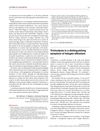Sensitive Scalp: An Epidemiologic Study in Patients with Hair Loss
January 2022
in “
Dermatology Reports
”

TLDR Many people with hair loss, especially those with telogen effluvium and alopecia areata, often have a sensitive scalp.
The study "Sensitive scalp: An epidemiologic study in patients with hair loss" conducted a retrospective observational study on 317 patients with trichological disorders to determine the prevalence of sensitive scalp. The study found that 32% of the patients, or 102 individuals, reported having a sensitive scalp. The condition was significantly more prevalent among patients with telogen effluvium, a type of hair loss, who also reported higher instances of pain, burning sensation, pruritus (itching), and trichodynia (scalp pain or burning). Patients with alopecia areata also had a significantly higher prevalence of pruritus and trichodynia. The study concludes that sensitive scalp is a common symptom among patients with hair loss, particularly those with telogen effluvium and alopecia areata.











